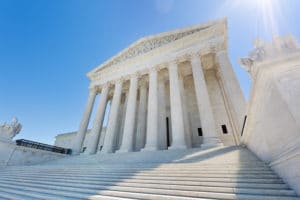The decision will have a significant impact on the practice of civil asset forfeiture
In late February, the United States Supreme Court made a ruling that will change the landscape of the criminal justice system in California. On February 20, the Supreme Court ruled unanimously that the Constitution’s prohibition on excessive fines applies to state and local governments. The result of this ruling is that law enforcement agencies across California will be limited in their ability to impose financial penalties and seize property.
The underlying case involved a man named Tyson Timbs. In 2015, Timbs was arrested for selling a few hundred dollars’ worth of heroin. After he pled guilty to the crime, the state seized his $42,000 Land Rover SUV as a result of his arrest through a process known as civil asset forfeiture. Significantly, the maximum fine for his criminal offense was just $10,000. Timbs sued to recover his SUV. Although he won at the trial court level, the Indiana Supreme Court found that the eighth amendment prohibition against excessive fines did not apply to the states. The Supreme Court found in his favor, and ordered the lower court to hold a new hearing based on its ruling.
In the decision, announced by Justice Ruth Bader Ginsburg, the Court wrote, “For good reason, the protection against excessive fines has been a constant shield throughout Anglo-American history: Exorbitant tolls undermine other constitutional liberties. Excessive fines can be used, for example, to retaliate against or chill the speech of political enemies. . . . Even absent a political motive, fines may be employed in a measure out of accord with the penal goals of retribution and deterrence.”
California, like many other states, relies on fees and fines to partially fund its law enforcement agencies. According to an experienced criminal attorney Orange County, CA, this can incentivize police to levy fines and file charges in order to secure funding for their own jobs. In a brief to the Supreme Court in this case, the American Civil Liberties Union (ACLU), stated that in California, a $100 ticket for a red light violation carried an additional $390 in fees. The U.S. Chamber of Commerce argued in its brief that 60% of the 1,400 municipal and county agencies surveyed across the country relied on forfeiture profits as a “necessary” part of their budget.
In California, asset forfeiture most often happens in drug cases. However, the state may seize assets in a range of cases. For example, if you use a computer to commit a crime, the state may seize it. Similarly, if you use a vehicle to transport stolen goods, it could be seized. According to a criminal attorney Orange County, CA, this new ruling from the Supreme Court may completely change asset forfeiture practices in California.
If you have been charged with a crime, there are a number of repercussions that may impact your life beyond potential jail time or fines. That is why it is so important to hire a skilled criminal attorney Orange County, CA to represent you. Even though the laws regarding excessive fines and asset forfeiture may change, it is still important to protect your rights. The Chambers Law Firm can help. Contact us today at 714-760-4088 or dchambers@clfca.com to schedule a free initial consultation.





